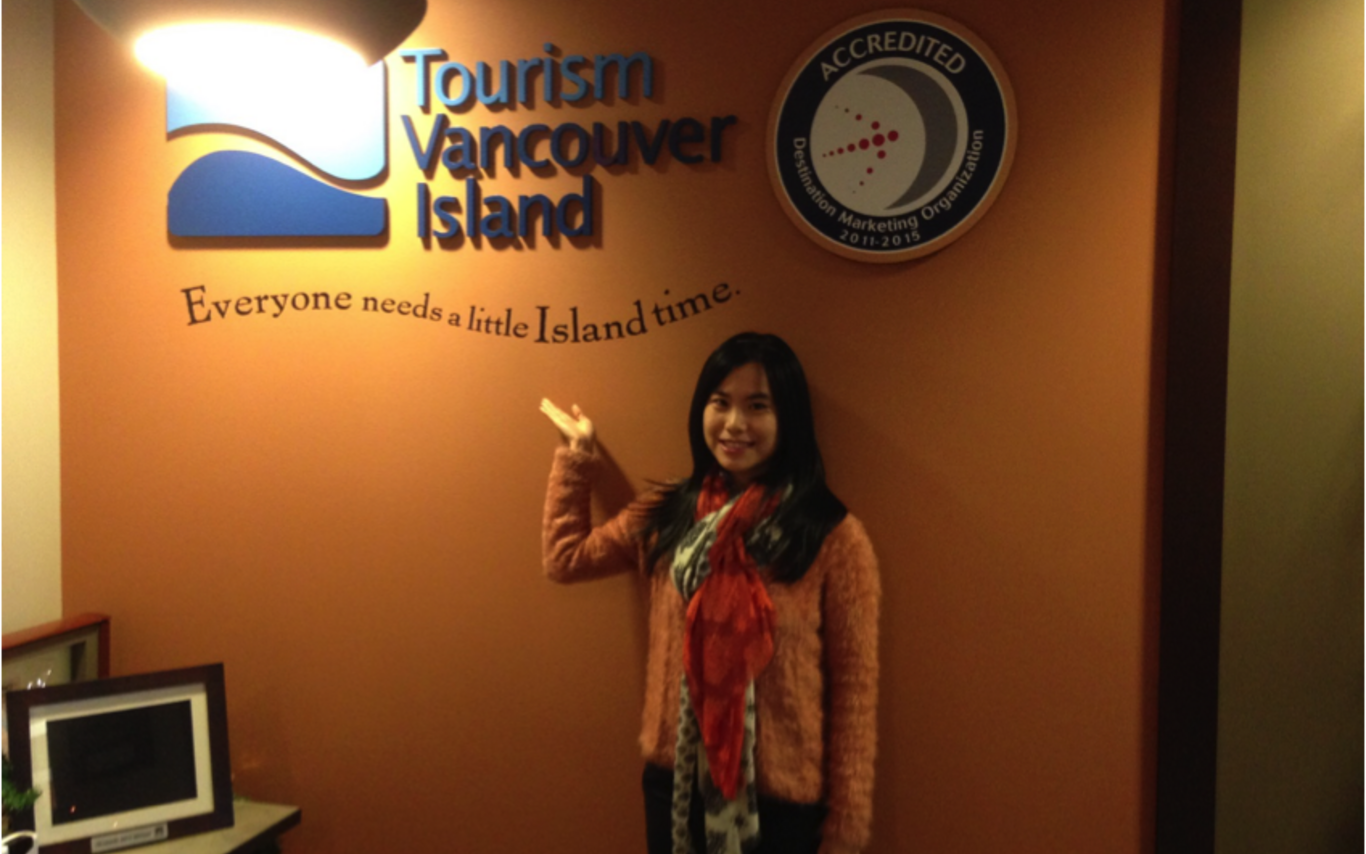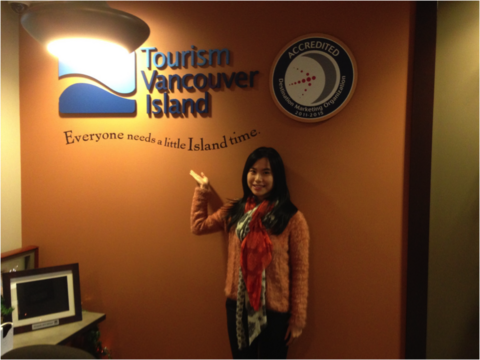MASLM Field Experience Report: My “Island Time” with Tourism Vancouver Island
By Xinting (Wendy) Liang
Introduction
Thanks to my supervisor Dr. Ken Hammer who helped to connect me with Tourism Vancouver Island (TVI), the primary regional Destination Marketing Organization (DMO), I had a practicum with this organization in the summer of 2014 from late May to the end of August. My job title was Research Student. I performed tasks and duties specific to research under the supervision of the Industry and Community Services department. This report will review my work at TVI, and mainly display my learning outcomes.
What I Did
I worked on a stakeholder satisfaction report which is to evaluate stakeholders’ satisfaction with services or programs provided by TVI over time. Also, I worked with the Industry and Community Services coordinator to refine the methodology for the Regional Municipal Leaders and the Value of Tourism Research. The last research project I did was to summarize the tourism industry on Vancouver Island. This comprehensive report will be used to inform stakeholders or potential investors. I also became involved in the coordinating of an annual conference with the organization.
Learning Outcomes
My practicum at TVI has produced significant learning outcomes which will be beneficial to my studies and future career. It has broadened my view on how a DMO supports local tourism businesses and what the guidelines are for being professional in a Western context.
How a DMO Supports Local Tourism Businesses
My first outcome is gaining the knowledge about how a DMO supports local tourism businesses. It supports them by providing marketing opportunities and industry and community service.
Marketing Opportunities
As a primary DMO in the region, TVI provides great marketing opportunities for stakeholders to market their business. These opportunities mainly include advertising programs, media and trade service. Annually TVI leverage a $484,633 investment from Destination British Columbia into more than $1.5 million in marketing opportunities. By joining these programs, stakeholders can save their expenditure on marketing or use the same budget to do more. Even though stakeholders require a stronger online presentation of their businesses, what I learned from Denise, manager of the marketing department, is the use of a variety of social media is always the way to go. The blended use of social media is just like a symphony which can generate more resonance than a single type of instrument.
The Explorer Quotient (EQ) research report is becoming a powerful marketing weapon for DMOs to refine their advertising programs. The EQ divides tourists into different types of explorers based on their values and psychological attributes. The advent of EQ has remarkably changed the design and content of promotional materials. With the use of EQ, whether a photo looks gorgeous is no longer the primary consideration. Instead, whether that photo can resonate with its target audience of a certain type of explorer is to be considered first.
TVI also works with journalists and travel agencies to promote the Vancouver Island region. The Trade and Media department divides travel media into different hierarchies based on their circulation. The department will host those journalists, sometimes including celebrities, to travel to the region and arrange itineraries for them. The highest level those journals or journalists belong to, the better funded their journeys will be. Similar to this, TVI hosts operators travel to the sample tourism destinations in the region and this encourages them to include these spots in their sales packages. Usually it takes 3-4 months to see the journal article published, and for travel agencies, it takes two years to see the sales outcomes. Last but not least, the staff at TVI will attend trade shows or consumer shows in some key markets across North America to promote tourism products in the region.
Industry and Community Services
Through Destination British Columbia’s Community Tourism Opportunities (CTO) program, Tourism Vancouver Island delivers co-operative funding for eligible tourism marketing activities in communities throughout the region. Apart from this, TVI offers workshops or meetings for stakeholders to become informed about the current industry knowledge and network with each other. Planning conferences is a main job for this department. The biggest conference in the year is the Annual General Meeting (AGM). This event is a three day event, including a golf tournament, community activities, conference, gala dinner with award ceremony, and online auction.
As to the gala dinner at the AGM, it has an award ceremony. There are six different awards given to stakeholders, such as the Innovator of the Year and the Tourism Sustainability. The winners of these awards each time are nominees who gain the highest scores, in each award category, from the evaluation by our colleagues. During the evaluation process, I was surprised to learn that whether a campaign or initiative is the most innovative or produces the most profitable outcomes are not the most important determinants for the prizes. Whether an initiative is sustainable and inspiring for the majority of stakeholders who are usually small business operators are what TVI values most. Some DMOs launched a very sophisticated marketing campaign generating substantial profits. If we think about the huge amount of money they have invested in this one-time event, it may not be considered as an initiative the majority stakeholders can learn from and it will not be sustainable. I appreciate that the organization values stakeholders who spare no effort into sustainable and innovative business ideas, such as a small hotel recycling and transforming old materials to be boutique decorations to create a nostalgic feeling for the customers. If we want to increase the sustainability of the tourism industry, we need to find out more sustainable practices to share with stakeholders and encourage them to try these practices.
TVI also strategically reaches out to stakeholders. They regularly send out newsletters to inform stakeholders about the latest marketing opportunities and industry news. The formats of the information they provided is tailored to different types of business so that the information is easy to follow. And they take the initiate to approach to stakeholders through social media. I appreciate their strategy of using social media and have learned a lot from it.
Professional Guidelines
The second main outcome is I learned what the professional guidelines are in a Western context. There is some commonality between the Western and the Asian guidelines. The common requirements are being punctual, being organized, and being a good communicator. Being on time is the primary requirement, as it shows whether a person has good management of his behavior and time and whether he has respect for others. Being organized has great importance as well. At TVI, all the documents are sorted out in a very organized way. Even for the same document, there are different files to track how it moves from its original design. I appreciate this practice. It helps us to improve our efficiency because we can always easily access the documents we want. Thus, being organized is a sign of being professional.
Last but not least, being a good communicator is required to be professional. The meaning of that is two-fold. First, it’s necessary to know how to communicate with our clients in a professional manner, such as the way we answer phones and the words we use in email correspondence. Secondly, communicating well with our colleagues makes great difference for our work. Having a pleasant and smooth communication with our colleagues can build up a good working relationship, which results in a more cheerful mood for work and an easier approach to our colleagues for work issues. At any workplace, we should bear in mind that working hard is not enough; we also need good communication with our colleagues.
The difference between the Western and Asian work context is that westerners pay more attention to the balance between work and life while Asians expect workers to work very diligently. “Work hard, play hard” is a tagline in TVI’s office and the staff has been putting it into practices. They will make the best use of their holidays to relax and energize themselves, while Asian workers usually don’t dare to ask their employers for vacations if the workload is heavy. If we want a sustainable society, our society needs to slow down and people need to work less.
Conclusion
I worked as a research student at Tourism Vancouver Island, the primary regional destination marketing organization. My primary job duty was research projects, but I became involved in coordinating other events of the organization. My work experience at TVI was very rewarding. It enabled me to acquire knowledge about how a regional DMO can support tourism businesses. These supports lie in the marketing opportunities and industry and community services. Through observing or participating in those practices, I have gained insight about the current marketing strategies used in the tourism industry, such as using EQ in the design of promotional materials, how to use multimedia in a marketing campaign, and how to reach out to a target audience more effectively. Moreover, I also learned what kinds of practices have been used to make a tourism business more sustainable. Furthermore, I have perceived what the Western professional guidelines are. The learning outcomes are substantial. They will be a great asset for my studies and lay a sound foundation for my future career.

